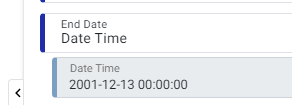Etiquetar fecha y hora
Con el Administrador de esquemas, puede agregar fácilmente datos y marcas de tiempo a blogs u otras piezas de contenido.
Ruta: Panel MPC > Esquema > Etiqueta/Vista > Esquema de etiqueta
Paso 1: en la sección 'Esquema de etiquetas', haga clic en 'Editar esquema' en la columna 'Acciones' correspondiente a la URL que desea editar

Paso 2: seleccione el 'Tipo de esquema' en el panel de navegación derecho

Paso 3: agregue el esquema a la página haciendo clic en '+'

Paso 4: Etiquete fechas y horas seleccionando las propiedades que desea etiquetar. Esto puede ser 'Fecha' o 'Fecha y hora'

Paso 5: seleccione el texto que desea etiquetar para datos estructurados y péguelo en la sección de datos/tiempo de datos

Paso 6: Haga clic en 'Validar' en la parte superior derecha de la pantalla

Paso 7: una vez que se valida el esquema, puede hacer clic en 'Publicar' en la parte superior derecha de la pantalla para publicar el esquema.

Nota
Si el año no está presente y la fecha está etiquetada, el año se toma como 2001

Si la hora no está presente y se selecciona el tipo de fecha y hora, la hora se establece como 00:00:00
